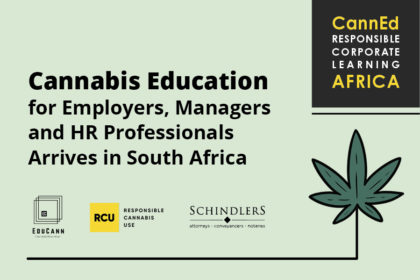
Cannabis Education for Employers, Managers and HR Professionals Arrives in South Africa
Brought to you by Schindlers Attorneys, RCU Canada and EduCann
Cannabis has, to a degree, been decriminalised in South Africa since September 2018. Although this doesn’t technically mean that cannabis is legal, it does mean that it is no longer a criminal offence for adults to grow and consume cannabis in their private spaces, for their own personal use.
What view does your company have on recreational and medicinal cannabis since the Judgment? Do you still hear negative terms such as ‘stoner’, ‘dagga’, or the ‘devil’s lettuce’ floating around the office space? This is largely a result of a lack of available education on the subject. Poor education on cannabis has placed this plant in a category worse than that of alcohol, which is widely accepted and available across the globe. However, a 2016 study noted that 3.8% of all female deaths and 12.2% of all male deaths in the year were attributed to alcohol, while none were attributed to cannabis.
Alcohol was attributed to the death of over 62 000 South Africans in 2015 alone. To fatally overdose on cannabis, a study established that an individual would have to consume between 15 and 70 grams of dried cannabis, which equates to smoking roughly 238 to 1 113 joints in a day – which even the most veteran of cannabis consumers is highly unlikely to reach.
These changes in legislation do have their implications in the workplace. Employers, managers and HR professionals will need to have a better understanding of the cannabis landscape in South Africa, so that they may ensure fairness in the workplace.
How well do you understand cannabis, cannabis impairment and our local laws surrounding the plant? If you think that you know it well enough, take this short quiz to put your knowledge to the test!
Take the quizz: How well do you understand cannabis?
The cannabis landscape in South Africa has changed a lot in the past few years and we will likely still face numerous changes. Being well prepared from the start will help your company adapt to these future changes.
Business owners and managers may be worried to hear that their employees may now legally consume cannabis in the comfort of their own homes. However, the educational cannabis courses presented by RCU, Schindlers Attorneys and EduCann are here to ease your mind and help you prepare for cannabis in the workplace. With an understanding of this plant in the South African context, professionals can prepare for the use of cannabis by their employees, how to identify and manage this, as well as to aid in creating a workplace policy that does not discriminate against cannabis users. At the end of this course, Schindlers Attorneys is well-positioned to help local companies draw up workplace policies that provide fairness and do not marginalise the cannabis consumer.
Why is this important? In September of 2018, it was deemed unconstitutional to prevent adults from consuming cannabis in private. This also means that some aspects of business workplace policy may now be deemed unconstitutional if it discriminates against a South African adult and their consumption of cannabis in private.
This course will provide Employers and HR Professionals with the knowledge of cannabis in South Africa, cannabis consumption, the impact of cannabis impairment at work, and best practices for creating a non-discriminatory workplace. Due to the changing legal landscape of this plant, it is vital to take active measures to ensure that you are well-informed and educated on key facts, regional laws and regulations, and actionable insight that can help you make responsible choices for your workforce.
With this collaboration, South Africans can take advantage of a 25% discount on these courses, helping businesses break down the stigmas around the cannabis plant and open the dialogue on cannabis in South Africa and our workplaces.

